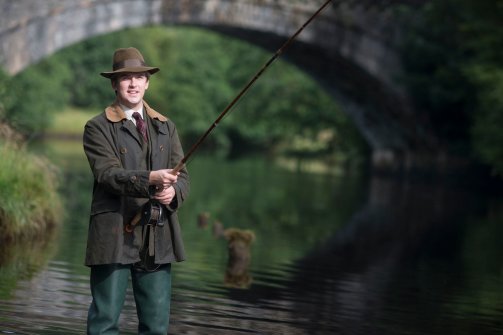Downton Abbey, Episode 3.7
Written by Julian Fellows
Directed by Andy Goddard
This 2-hour special transports the Crawleys out of Downton Abbey and all the way to Scotland, where they dance, hunt, and escape their problems for a while. This episode doesn’t possess the charm or warm feelings of the previous season closer, but it does nicely tie a bow on many of the issues raised throughout season three and sets up an impossibly hopeless situation to be dealt with in the future.
The conflicts of this episode belong almost exclusively to the family the Crawleys have come to visit, and while their problems reflect very familiar scenarios, the outcomes could not be more different. The MacClares represent a sort of pseudo-Crawley family. They seem to be the writer’s answer to several what if questions. What if Robert and Cora never patched up their marriage? What if the family fortune had not recovered from Robert’s bad investments? What if Cora had hated her daughters?
The MacClares operate almost as a cautionary tale for what might have happened if the Crawleys weren’t nicer people to each other, and to their servants. The obvious corollaries between Crawley and MacClare help drum up some sympathy for the lesser known characters. Although it seems as if Susan is meant to be irredeemably insufferable. It might seem as though the Crawleys escaped ruin without too much effort, but time with the MacClares indicates quite cleverly that things may have easily gone the other way.
It does feel as if we’re being force fed Rose as a replacement for the Crawley daughter we lost just a short time ago, but so far the aspiring society girl appears a pale imitation and hardly the blithe spirit needed to fill the void left by Sybil. However, the strained relationship she shares with her mother does point to a pretty complex and possibly intriguing character development. Who wouldn’t grow up rebellious with a mother like that?
Back at Downton, Mrs. Patmore also has her chance to explore a different kind of “what if.” What if she left her life as a domestic worker for a different sort of domestic life? It’s nice to see the good-natured cook, always a scene stealer, getting a turn as the focal point in her own storyline. And over the course of her mini-adventure, she transforms into a blushing girl, embarrassed and giddy to receive the flirtatious attentions of a gentleman caller, but before it’s all over, she restores herself to a strong-willed independent woman, much more content to receive a wage for her cooking than the doting proclamations of a fickle lover. Like a day at the carnival, Mrs. Patmore’s contemplations of matrimony make for a diverting exercise, but there’s a certain comfort in knowing that at the end of the day, we’ll be back to business as usual.
While the bulk of the episode harmlessly entertains dire possibilities, it wraps by fully realizing of one of the worst “what ifs” one could imagine for the show. What if the Crawleys didn’t have Matthew to depend on? That is the big “what if” that will lead us into the next season. Thus far, every time the Crawleys have needed a savior, Matthew has stepped up to fill that role. He has been defender to Tom and Edith. He played the voice of reason, and compassion, and progress. And he brought out the best side of Mary, exposing her as a vulnerable, deeply feeling character and not just the snobbish and distant daughter of a lord, as everyone else apparently sees her. How will the Downton household continue without his help? Has the family learned how to come to their own rescue? Unfortunately, answers to these questions will require some patience.
Kenneth Broadway


